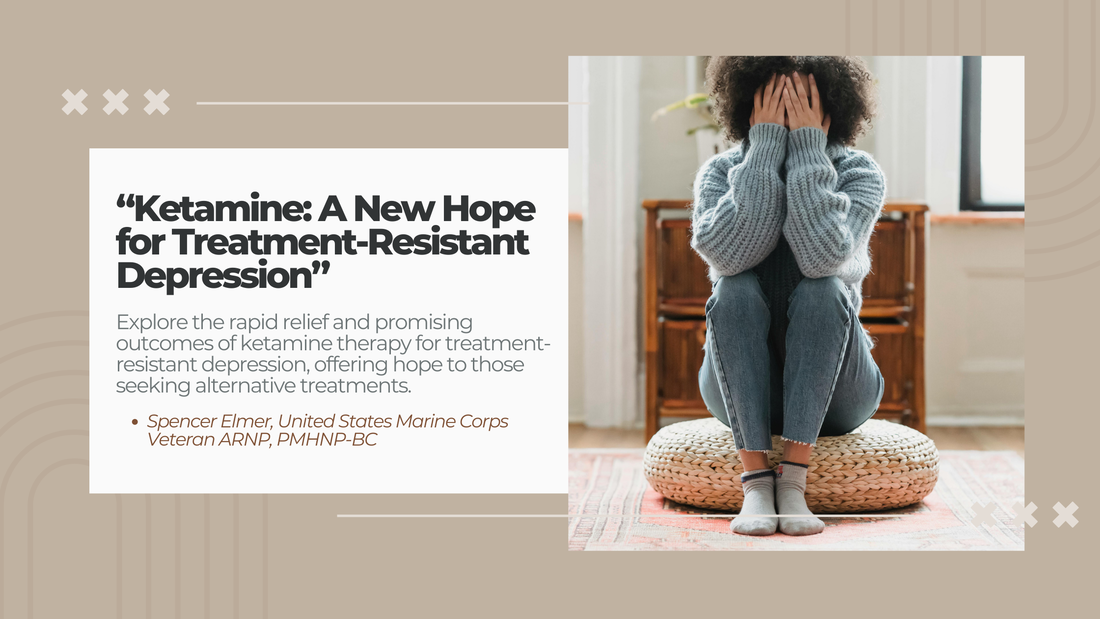Spencer ElmerARNP, PMHNP-BC In the complex world of mental health treatment, the quest to find effective therapies for conditions like depression has been ongoing. Despite advancements in medication and therapy, there remains a subset of individuals who do not respond to conventional treatments. For these people, hope may lie in the innovative approach of ketamine treatment.
Ketamine, once primarily used as an anesthetic, has garnered attention in recent years for its potential in treating treatment-resistant depression (TRD). TRD is a form of depression that persists despite treatment with multiple antidepressants or other therapies. This debilitating condition affects millions worldwide, leaving individuals and their loved ones searching desperately for relief. Most antidepressants can take 4-6 weeks before one sees improvement in depressive symptoms. Ketamine can often improve depression in 24 hours, according to a study by Mandal et al. (2019). There is a short time while receiving the medication where dissociation, dizziness, etc. can occur, but these subside quickly, and most people can resume their daily activities. This rapid onset of action can be life-changing for those in the depths of despair, providing almost immediate relief from symptoms. But how does ketamine work, and why is it effective for TRD? While the exact mechanisms are still being researched, ketamine is believed to act on neurotransmitters such as glutamate, which plays a crucial role in mood regulation. Additionally, ketamine has been found to promote the growth of new synaptic connections in the brain, a process known as synaptogenesis, which may help repair circuits that are disrupted in depression. A landmark study done by Berman et al. (2000) showed the potential role for NMDA receptor-modulating drugs in the treatment of depression. It’s not the medication itself that heals, but rather the person’s reaction to the medication. It can create new neural pathways to make you more resilient and also resistant to returning symptoms. The results of ketamine treatment for TRD have been promising. Many individuals who have not responded to other treatments experience significant improvements in mood, often describing a lifting of the heavy fog that depression casts over their lives. Some report feeling like themselves again for the first time in years, able to engage in activities they once enjoyed and reconnect with loved ones. Ketamine works best when combined with lifestyle changes and therapy. There’s also strong evidence to support ketamine’s increased efficacy when combined with other antidepressant medications (Daly et al., 2018). Anecdotal evidence is strong for the reduction of anxiety and PTSD symptoms as well. Typically, patients receive a series of treatments over several weeks, followed by maintenance sessions as needed to sustain the benefits. Ketamine stands as a beacon of hope for those who have exhausted other options in their battle against TRD. While the journey towards mental wellness may be long and arduous, innovations like ketamine treatment offer a lighthouse in the darkness, reminding us that healing is possible, even in the most challenging of circumstances. Ketamine treatment is already available at Integrative Family Medicine through Dr. Fitch and myself (psych NPs). We’ve had many patients tell us that their experience with ketamine has been very positive and that they wish this was a solution they’d found sooner. Most people have noticed immediate improvements in various symptoms, and we want to make these benefits available to as many people as possible! Stay tuned for some very exciting news about new ketamine treatment options that offer even more efficacy in the fight against TRD. References Berman, R. M., Cappiello, A., Anand, A., Oren, D. A., Heninger, G. R., Charney, D. S., & Krystal, J. H. (2000). Antidepressant effects of ketamine in depressed patients. Biological psychiatry, 47(4), 351–354. https://doi.org/10.1016/s0006-3223(99)00230-9 Daly, E. J., Singh, J. B., Fedgchin, M., Cooper, K., Lim, P., Shelton, R. C., Thase, M. E., Winokur, A., Van Nueten, L., Manji, H., & Drevets, W. C. (2018). Efficacy and Safety of Intranasal Esketamine Adjunctive to Oral Antidepressant Therapy in Treatment-Resistant Depression: A Randomized Clinical Trial. JAMA psychiatry, 75(2), 139–148. https://doi.org/10.1001/jamapsychiatry.2017.3739 Mandal, S., Sinha, V. K., & Goyal, N. (2019). Efficacy of ketamine therapy in the treatment of depression. Indian journal of psychiatry, 61(5), 480–485. https://doi.org/10.4103/psychiatry.IndianJPsychiatry_484_18
2 Comments
Nealy
4/16/2024 07:49:26 pm
How does one book an appointment to see if this therapeutic application would be a good fit for a client? Or who is the Doctor to speak to to find out more information?
Reply
4/22/2024 10:30:42 am
You can easily book an appointment via our website's "Book an Appointment" tab. If you're interested, you can schedule with either Danielle Fitch or Spencer Elmer, our psychiatric NP's, who can provide you with more information and determine if this therapeutic application is a good fit for you or your client. Looking forward to hearing from you!
Reply
Your comment will be posted after it is approved.
Leave a Reply. |
Blog Info
Archives
June 2024
Categories
All
|
|
Visit our Locations
IFM | West Des Moines 475 S. 50th St., Suite 600 West Des Moines, IA, 50265 *Temporarily Closed* IFM | Ankeny 207 NE Delaware Ave. Suite 20 Ankeny, IA 50021 |
Office HoursMonday 9:00 a.m. - 5:00 p.m. Tuesday 9:00 a.m. - 5:00 p.m. Wednesday 9:00 a.m. - 5:00 p.m. Thursday 9:00 a.m. - 5:00 p.m. Friday by appointment. Sat & Sun Closed |
© 2024 Integrative Family Medicine of Iowa, PLLC.
All rights reserved.
All rights reserved.



 RSS Feed
RSS Feed

